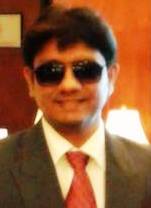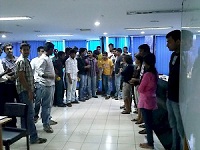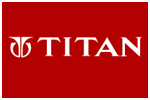DataWell Corporation
DataWell commenced as a
partnership firm in 1975, manufacturing and assembling communication equipments
and parts for computers at Pune formerly known as Poona
in Maharastra state of India.
The managing director, Mr. Sanjeev (earlier worked for IBM) had his close
friends and family members to assist him in the operations and planning. The
firm grew vigorously and had in its clientele very prestigious customers from
the private sector as well as from the Government of India. Initially the firm
adopted a traveling marketing and service teams for their clients spread in India. They
stationed engineers for larger accounts.
The 1980s saw the firm
establishing itself further into the field of software training, by now they
had started selling computers for communication. DataWell was able to attract
the status of authorized training centers from world famous brands such as
Autodesk, Microsoft and later on even from Novell and Oracle. Their main
competitor was only MIIT a company owned and operated by an IT Major. Software
training turned out to be a venture with very high returns to scale in a short
time and
by the year 1991 they had spread
their wings to nearly 110 centers in India covering almost all the major
cities and metros. DataWell fully owned only 12 centers and the balance were
either franchises or satellites. A venture capitalist or entrepreneur could
align with DataWell either as a Franchise or a Satellite. In the case of a
franchise the VC or entrepreneur would invest up to 80 % of the cost for
designing and running the DataWell center at an exclusive region in India. The cost
includes payment of salaries and maintaining professional staff. The franchise
would remit 20% of the returns, subject to self-audit, to DataWell corporation
besides the royalty (deposit) amount. On the other hand a satellite would
invest up to 30% of the center design and maintenance cost, and would receive
only 25% of the returns through DataWell, due to professional staff salaries
being paid by the corporation.
By 1990 the corporation had also
started to market software from Microsoft and other majors in India. This
software sales was run by a separate Cell. All this meant that the headquarters
was situated at Pune, with their corporate offices at major cities and metros.
A typical DataWell center would have a software training premises, which
included computer lab, reception, library, Administrative cabins, classrooms.
In the same premises there would be an exclusive office space for DataWell
software sales which included their own application software besides selling
leading software, and a DataWell hardware and communication division.
Problems since 1995
Industry
The IT industry was facing a recession, and the dot com boom
had just misfired.
There were many players in software training and sales, the
same applied to the hardware markets. With the price cuts, feature based
competition all companies were facing a dwindling profit margin. However, there
were exceptions with respect to certain major players due to their
international presence and public issues. MIIT had such a backing. Some of the Indian
IT training companies listed in the stock market crashed. To add on software
licenses, and newer versions were being released. The Indian IT market was
trying to adjust to global requirements being lead by the developed American
and European markets. DataWell which was in the number 2 position with respect
to training and sales was thrown to 10th position. At this time an
excellent offer was made by a major Auto manufacturer to buy the company. Mr.
Sanjeev declined the offer.
Partners
The franchises felt they were being left out during further
growth decisions of the company, such as DataWell had gone public and they were
not consulted or offered participation. There was delay in satellite payments.
Some felt if they had invested their money even in nationalized banks they
would have had a steady return. The Chennai center closed down because a
Franchise turned satellite felt the ‘company had done a breach of trust’.
Bangalore, Delhi and Mumbai centers run by the company
were doing well. 4 of the remaining franchise centers were managing by themselves.
Some felt in the training side good staff were leaving the organization for
better prospects.
On the whole many of franchise and satellites were ready to
wind up their operations and move on.
Management
The organization under Mr. Sanjeev had friends and relatives
at key and critical positions to manage the entire operations and planning. These
positions would include Partner handling, Growth and Quality assurance, Finance
and Administration, Training
Centers, Hardware
Division, Software Division. All reported to the MD. And each of the position
heads had freedom to design their staff network which would trickle down up to
the branch manager levels or even beyond.
Due to industry changes, there was difference of opinion
among the management members. One of the senior most advisor and friend of Mr.
Sanjeev quit the group to start his own enterprise and two members followed
very soon. A relative and senior manager was held up in a quid pro quo case at
a bangalore
center, and was soon recalled to the head office.
Market
The market position held by DataWell fell drastically due to
bigger well established global brand names in the hardware market, multi
channel software sales by leading players including Microsoft and a software
training market which was becoming more and more skill based was swinging
towards professional courses offered by regular universities and institutes.
The private trainers were losing ground on account of certifications and the
need to obtain post graduate or masters certificates recognized by the
industry. MIIT with their backing had swung into some major advertisement
campaigns to bring focus on their strengths but the effort did not pay any rich
returns. DataWell management adopted a policy to wait and watch. Whereas another
major IT training company sold its operations and move on.
Personnel
Staff who gained talent at their current employment quit for
better pastures. New staff and some of the old staff had difference of opinions
leading to frequent conflicts which decreased productivity. The mingling(being
at the same location) of staff from different cells (training, hardware and
software) was not encouraged by their respective heads, and was viewed as
grouping against the management, for they had a divide and rule policy with
personnel but at the corporation level it was a single listed company according
to the staff.
Discussion questions:
1. Technology strategy should lead
to a good match with the KYC and Consideration Sets, how would you examine the
business policy in DataWell and its compliance to its own regulations,
positions or market changes and strategies for facing competition.
2. Into how many segments can you
divide the target market for a corporation like DataWell? How would you
determine their respective market growth, develop growth strategies and
policies for an organization like DataWell.



















